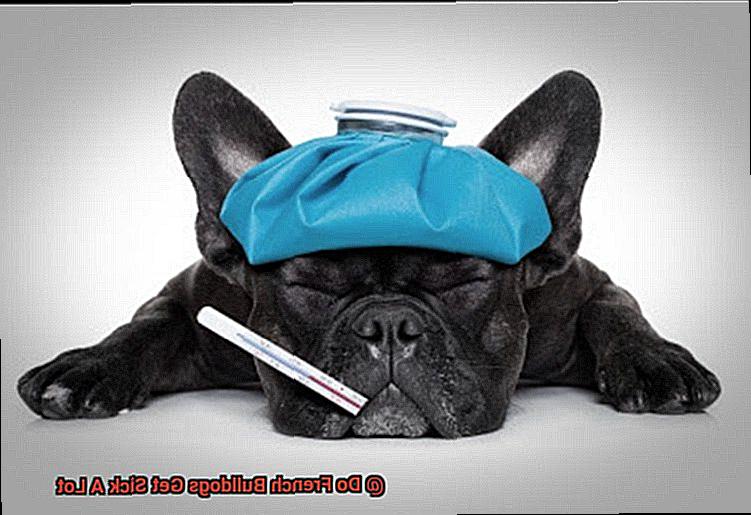Do French Bulldogs Get Sick A Lot?
These little cuties are all the rage with their cute ears and playful personalities. But before you dive headfirst into Frenchie fever, let’s talk about their health.
While they’re usually pretty tough cookies, French Bulldogs can be more prone to certain illnesses than other breeds. In this blog post, we’ll dig into the common health issues that might make these adorable pups more susceptible to getting sick.
So whether you’re already a French Bulldog fanatic or just thinking about becoming one, stick around to learn all about their health concerns.
Do French Bulldogs get sick a lot
Contents
- 1 Do French Bulldogs get sick a lot
- 2 What Health Issues are Common in French Bulldogs?
- 3 Allergies and French Bulldogs: What You Need to Know
- 4 Spinal Disorders in French Bulldogs: Intervertebral Disc Disease (IVDD) and Hemivertebrae
- 5 Obesity in French Bulldogs: How to Avoid It
- 6 Heatstroke and French Bulldogs: The Risk of Overheating
- 7 Prevention is Key: Regular Veterinary Check-ups, Proper Nutrition, Exercise, and a Safe Environment
- 8 Conclusion
French Bulldogs are adorable and lovable companions, but they do have some health concerns that may make them more prone to getting sick compared to other dog breeds. Let’s explore why.
- Respiratory Issues: French Bulldogs have a unique skull shape called brachycephalic, which means they have a short snout and compact airways. This can lead to respiratory problems such as brachycephalic airway syndrome (BAS). BAS can cause difficulties in breathing and make them more susceptible to respiratory infections. So, if you see your Frenchie panting excessively or struggling to catch their breath, it’s time for a visit to the vet.
- Skin Sensitivities: French Bulldogs have sensitive skin and are prone to allergies. These allergies can manifest as itching, redness, rashes, and even infections. Environmental factors like certain allergens or harsh weather conditions can worsen these skin issues. Regular grooming and using hypoallergenic products can help keep their skin healthy and minimize the risk of skin infections.
- Genetic Disorders: French Bulldogs are also prone to certain genetic disorders and structural abnormalities. One example is “cherry eye,” where the gland in their eye becomes prolapsed, leading to redness and irritation. Another concern is hip dysplasia, a condition where the hip joint doesn’t form properly, causing pain and mobility issues. Responsible breeding practices can help reduce these genetic disorders.
- Gastrointestinal Problems: Just like any other dog breed, French Bulldogs can experience gastrointestinal issues such as food sensitivities or allergies. These issues can lead to digestive problems like diarrhea or vomiting. Providing a balanced diet and monitoring their eating habits can help prevent these issues.
- Heat Sensitivity: Due to their brachycephalic structure, French Bulldogs have difficulty regulating their body temperature through panting. This makes them more susceptible to heatstroke, especially in hot weather or when exposed to high temperatures for extended periods. It’s essential to keep them cool and provide them with plenty of water during hot summer months.

While it’s not accurate to say that all French Bulldogs get sick a lot, they do have some health concerns that are more prevalent in this breed compared to others. Regular veterinary check-ups, proper nutrition, exercise, and a safe environment are crucial for maintaining the health of French Bulldogs. By being proactive and attentive to their specific needs, you can help your Frenchie live a healthy and comfortable life.
What Health Issues are Common in French Bulldogs?
French Bulldogs, with their adorable squished faces and compact bodies, are undeniably one of the cutest dog breeds out there. However, their unique physical characteristics also make them more prone to certain health issues. As an expert on French Bulldogs and a proud owner myself, I want to share some insights into the common health issues that these lovable pups may face.
- Brachycephalic Airway Syndrome: One of the most well-known health issues in French Bulldogs is Brachycephalic Airway Syndrome. This condition is caused by their short snouts and narrow airways, which can lead to breathing difficulties. It’s important for owners to be mindful of this, especially during exercise or in hot weather when their breathing can become even more challenging.
- Allergies: French Bulldogs are known to be sensitive souls when it comes to allergies. They can develop skin irritations, itching, and ear infections due to food or environmental allergens. It’s crucial to identify and eliminate triggers to keep their skin healthy and prevent discomfort.
- Eye Problems: Cherry eye and corneal ulcers are common eye problems that French Bulldogs may experience. Cherry eye occurs when the gland of the third eyelid protrudes and becomes visible. Corneal ulcers, on the other hand, can result from scratches or trauma to the eye. Prompt veterinary attention is essential for proper diagnosis and treatment.
- Hip Dysplasia: Like many other breeds, French Bulldogs can also be prone to hip dysplasia. This condition occurs when the hip joint doesn’t develop properly, causing pain and mobility issues. Regular exercise, a healthy diet, and weight management can help reduce the risk of hip dysplasia.
- Intervertebral Disc Disease (IVDD): IVDD is a spinal condition that commonly affects French Bulldogs. It happens when the discs between the vertebrae degenerate or herniate, leading to spinal cord compression and neurological symptoms. Proper exercise, weight management, and avoiding activities that strain the back can help prevent this condition.
- Obesity: French Bulldogs have a tendency to gain weight easily, which can lead to various health problems. Joint issues, heart disease, and respiratory difficulties are just a few of the potential consequences of obesity in French Bulldogs. Maintaining a balanced diet and regular exercise are key to keeping them fit and healthy.
- Skin Fold Dermatitis: With all those cute wrinkles and folds, French Bulldogs are prone to skin fold dermatitis. These areas can trap moisture and become a breeding ground for bacteria and yeast infections. Regular cleaning and drying of the folds can help prevent this uncomfortable condition.
Allergies and French Bulldogs: What You Need to Know
French Bulldogs are undoubtedly adorable and lovable pets, but they are also prone to certain allergies that can impact their overall health and well-being. As a responsible owner, it’s important to be aware of these allergies, their symptoms, and how to effectively manage them. Let’s dive into the world of allergies in French Bulldogs and equip you with the knowledge you need to keep your furry friend happy and healthy.
Food Allergies: Watch Out for Those Ingredients.
One common allergy among French Bulldogs is food allergies. Just like humans, these little pups can develop adverse reactions to specific ingredients in their diet. Beef, chicken, grains, and dairy products are some common culprits. If your Frenchie is experiencing a food allergy, you may notice symptoms such as itching, skin rashes, gastrointestinal issues like diarrhea or vomiting, and even ear infections.
Environmental Allergies: It’s Not Just Pollen
French Bulldogs can also suffer from environmental allergies. These allergies arise from exposure to various substances present in their surroundings. Mold spores, pollen from flowers or trees, and even dust mites in the home can trigger allergic reactions. Symptoms of environmental allergies in French Bulldogs can manifest as itching, sneezing, watery eyes, and respiratory problems.
Identifying Allergens: A Vet’s Expertise is Key
If you suspect that your French Bulldog has allergies, it’s crucial to consult with a veterinarian. They will be able to determine the exact allergen causing the reaction. Your vet may recommend conducting allergy tests or implementing an elimination diet to identify the specific trigger(s). Identifying the allergen is the first step in effectively managing your Frenchie’s allergies.
Managing Allergies: From Diet to Medication
Once the allergen is identified, steps can be taken to manage and alleviate the symptoms. Avoiding the allergen altogether is ideal, but not always possible. Making dietary changes to eliminate specific ingredients that trigger the allergy can be helpful. Using hypoallergenic grooming products and implementing environmental modifications like regular cleaning and air purifiers can also minimize exposure to allergens.
In some cases, medication or immunotherapy may be prescribed by the veterinarian to help alleviate the symptoms of allergies in French Bulldogs. Antihistamines can reduce itching and inflammation, while corticosteroids can suppress the immune response. Immunotherapy involves gradually exposing the dog to small amounts of the allergen to desensitize their immune system.
Conclusion: Keeping Your Frenchie Allergy-Free
While French Bulldogs may be more prone to allergies compared to other breeds, proper management and care can help minimize the impact of these allergies on their health and quality of life. Regular veterinary check-ups, a balanced diet, and a clean living environment are essential in keeping allergies under control and ensuring the overall well-being of your French Bulldog.
Spinal Disorders in French Bulldogs: Intervertebral Disc Disease (IVDD) and Hemivertebrae
Intervertebral Disc Disease (IVDD): A Pain in the Back
Intervertebral Disc Disease (IVDD) is a common spinal disorder that can cause a lot of discomfort and pain for French Bulldogs. This condition occurs when the discs, which act as cushions between the vertebrae in the spine, become degenerated or herniated. The pressure on the spinal cord can result in pain, difficulty walking, and even paralysis.
Why are French Bulldogs more prone to IVDD? Well, it all comes down to their unique body structure. These little cuties have a compact and muscular build with a short spine, which means there’s increased stress on those intervertebral discs. And if that’s not enough, their relatively large heads and broad shoulders can add even more strain on the spine. Ouch.
So, what are the signs of IVDD in French Bulldogs? Well, it can vary depending on the severity of the condition. In mild cases, you might notice your Frenchie experiencing back pain, being reluctant to move, and struggling with activities like jumping or climbing stairs. But in more severe cases, you might see weakness or paralysis in their hind limbs and even loss of bladder or bowel control.
Diagnosing IVDD usually involves a physical examination, neurological evaluation, and imaging tests like X-rays or MRI scans. Treatment options range from conservative management to surgery. Rest, pain medication, and physical therapy can help alleviate symptoms and promote healing in milder cases. But if things are more serious and there’s significant compression of the spinal cord, surgery may be necessary.
Hemivertebrae: Curves Ahead.
Another spinal disorder that can affect French Bulldogs is hemivertebrae. This fancy term refers to abnormal wedge-shaped vertebrae that can cause a curvature of the spine. And guess what? This condition is often present at birth, so it’s important to be aware of it if you’re a proud French Bulldog parent.
How does hemivertebrae affect our furry friends? Well, it can cause an abnormal gait, difficulty jumping or running, and even neurological deficits if the spinal cord is affected. The severity of these symptoms depends on the number and location of the affected vertebrae.
So, how do we treat hemivertebrae in French Bulldogs? It all depends on the extent of the spinal deformity and the associated symptoms. In mild cases, conservative management like physical therapy and exercise modification may be enough to manage the condition. But for more severe cases, surgery might be necessary to correct the spinal deformity and relieve pressure on the spinal cord.
Obesity in French Bulldogs: How to Avoid It
French Bulldogs are known for their adorable and compact bodies, but unfortunately, they are prone to obesity. This is a serious health concern that can have detrimental effects on their overall well-being. As an expert on French Bulldogs, I understand the importance of addressing this issue and providing guidance on how to prevent obesity in these beloved pets. So, let’s dive into some pawsome tips to keep your Frenchie fit and fabulous.
- Watch What They Eat: Portion control is key. French Bulldogs have a hearty appetite, but it’s important to feed them the appropriate amount of food for their size and activity level. Choose a high-quality dog food specifically formulated for French Bulldogs and avoid excessive treats or table scraps that can pack on the pounds.
- Get Moving: French Bulldogs may have a moderate energy level, but they still need regular exercise to stay in shape. Daily walks, playtime, and interactive toys are great ways to keep them active and prevent weight gain. Remember, a tired Frenchie is a happy Frenchie.
- Vet Check-Ups: Regular check-ups with your veterinarian are crucial in preventing obesity. They can assess your Frenchie’s weight and body condition score, provide nutrition guidance, and recommend any necessary dietary adjustments or supplements. Trust me, your vet knows best.
- Pay Attention to Eating Habits: Some French Bulldogs have a genetic predisposition to obesity or may develop emotional eating habits due to stress or anxiety. Be mindful of these factors and address any underlying issues to prevent overeating. Your Frenchie’s mental well-being is just as important as their physical health.
- Create a Supportive Environment: Remove any temptations or access to food when you’re not actively feeding your Frenchie. Establish a feeding schedule and stick to it, as routine can help regulate their eating habits. And don’t forget to designate a feeding area, so they know where mealtime happens.
Remember, prevention is key. By controlling portion sizes, providing regular exercise, offering a balanced diet, and monitoring their eating habits, you can help your French Bulldog maintain a healthy weight and overall well-being. So, let’s keep those Frenchies fit and fabulous together.
Heatstroke and French Bulldogs: The Risk of Overheating
It’s important for French Bulldog owners to be aware of the increased risk of overheating and heatstroke in their furry friends. These adorable pups may be more susceptible to these conditions due to their unique brachycephalic facial structure. So, grab a cool drink, sit back, and let’s dive into why French Bulldogs need extra attention when it comes to staying cool.
The Brachycephalic Challenge
French Bulldogs, like other brachycephalic breeds, have shorter snouts and narrower airways. While these features make them irresistibly cute, they can also hinder their ability to effectively cool down. Unlike dogs with longer snouts who can pant efficiently, French Bulldogs struggle to regulate their body temperature through panting alone. This puts them at a higher risk of overheating.
Spotting the Signs
Recognizing the signs of heatstroke is crucial for French Bulldog owners. Keep an eye out for excessive panting, drooling, rapid breathing, weakness, vomiting, diarrhea, collapse, and even seizures. Remember, prevention is key.
Preventing Heatstroke
To keep your French Bulldog cool and comfortable during hot weather, take some simple precautions. Avoid strenuous exercise during peak heat hours and provide plenty of fresh water and shade. Never leave your Frenchie in a hot car or enclosed area without proper ventilation – it can turn into a doggy oven within minutes.
Cool Solutions
Keep indoor temperatures cool using air conditioning or fans. You can also provide your Frenchie with cooling mats or wet towels to help lower their body temperature. They’ll appreciate the extra TLC.
Acting Fast
If you suspect your French Bulldog is suffering from heatstroke, quick action is essential. Move them to a cool area, apply cool (not cold) water to their body, offer small amounts of water to drink, and contact a veterinarian for further guidance. Time is of the essence.
Prevention is Key: Regular Veterinary Check-ups, Proper Nutrition, Exercise, and a Safe Environment
Prevention is Key: Regular Vet Check-ups, Proper Nutrition, Exercise, and a Safe Environment
French Bulldogs are undeniably charming and lovable companions, but like any other breed of dog, they can be prone to certain health issues. However, with proper preventive care, their overall health can be maintained. In this section, we will explore the importance of regular veterinary check-ups, proper nutrition, exercise, and a safe environment in keeping French Bulldogs healthy and happy.
Regular Veterinary Check-ups: A Paw-sitive Step
Just like humans, French Bulldogs need regular check-ups with their veterinarian. These check-ups serve as an opportunity for the vet to monitor their health and catch any potential issues before they escalate into major problems. Vaccinations and preventive treatments are also administered during these visits. It is recommended to schedule check-ups at least once a year, but more frequent visits may be necessary for senior dogs or those with pre-existing conditions.
Proper Nutrition: Fuel for Frenchie Fun
The saying “you are what you eat” holds true for our furry friends as well. French Bulldogs should be fed a well-balanced diet that is specifically formulated for their breed, age, and size. This ensures that they receive the necessary nutrients to support their overall health. It is important to avoid overfeeding and provide appropriate portion sizes to prevent obesity, which can lead to various health problems.
Exercise: Shake that Frenchie Booty.
While French Bulldogs may not require extensive exercise like some other breeds, they still need regular physical activity to stay fit and healthy. Daily walks and playtime are recommended to maintain a healthy weight, strengthen their muscles, and stimulate their minds. However, it’s important to consider their individual needs and limitations. French Bulldogs can be prone to overheating and respiratory issues due to their brachycephalic (short-nosed) structure. So, make sure to take it slow and provide plenty of water breaks during exercise sessions.
A Safe Haven: Protecting Your Frenchie
Creating a safe environment is essential in preventing accidents and injuries for French Bulldogs. These curious little bundles of joy can easily get into trouble if not supervised properly.
Keep harmful substances out of their reach, secure fences and gates, and make sure to supervise them when exploring new environments. Their small size also makes them prone to falls from high places, so be mindful of your Frenchie’s surroundings.
By implementing these preventive measures and providing proper care, French Bulldog owners can significantly reduce the chances of their pets falling ill frequently. Regular veterinary check-ups ensure early detection and timely treatment of any health issues, while proper nutrition, exercise, and a safe environment contribute to their overall well-being.
Conclusion
French Bulldogs are known for their adorable appearance and charming personalities. However, when it comes to their health, some concerns arise. It is true that French Bulldogs can be more prone to certain health issues compared to other breeds. Their unique physical characteristics, such as their short snouts and compact bodies, can contribute to respiratory problems and overheating. Additionally, they may have a higher risk of developing allergies, skin conditions, and joint issues.
But let’s not jump to conclusions just yet. While French Bulldogs may have a predisposition towards these health concerns, it doesn’t mean they are constantly sick. With proper care and attention from responsible owners, many of these potential issues can be managed or even prevented.
It’s important to note that not every French Bulldog will experience all of these health problems. Each dog is an individual with its own genetic makeup and lifestyle factors that can influence its overall well-being. Regular visits to the veterinarian, a balanced diet, exercise suitable for their physical abilities, and maintaining a comfortable environment are crucial in keeping your French Bulldog healthy.
So, yes, while French Bulldogs may have a slightly higher likelihood of encountering health issues compared to some other breeds, it doesn’t mean they are doomed to constant sickness.




